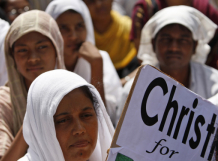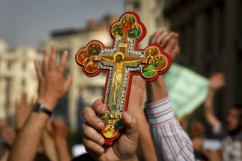Fighting between rival groups in Libya's main cities has displaced 100,000 people, and caused another 150,000 to flee the country, a United Nations report said today.
Numerous human rights abuses, including indiscriminate killing and abductions, took place between May and August, the report issued by the United Nations Support Mission in Libya and the Office of the High Commissioner for Human Rights said.
Yesterday Islamist-allied group Fajr Libya, or Libyan Dawn, appointed a new government in Tripoli, rivalling the existing government, which was only elected in June.
Libyan Dawn took control of the capital on August 24 following intense fighting between rival groups since July 13.
They reconvened an assembly of the National General Congress, the interim government that controlled Libya after the toppling of Colonel Muammar Gaddafi in 2011.
The elected parliament has fled to Tobruk in the east to escape the fighting. It said in a statement: "The government reiterates that these buildings and the public headquarters are not safe and inaccessible, because they are under the control of armed men."
Tripoli airport has been at the centre of the violence, and yesterday it was reported that at least 11 commercial planes belonging to the two state-run airlines had been commandeered by the militants, sparking fears of possible attacks on the anniversary of 9/11.
In Benghazi, Libya's second largest city, a retired military general launched Operation Dignity against rival group the Shura Council of Benghazi Revolutionaries in May.
The violence between the armed groups has included air strikes and bombing on heavily populated areas.
The lack of trained forces and well-maintained ammunition poses an additional risk – both to the fighters and the civilian population.
"In comparison to typical armed forces, armed groups in Libya have received little training and do not operate with the appropriate discipline and command and control systems. Fighters appear often to disregard the likely impact on civilians, and sometimes on themselves, of their actions," the UN report said.
"Furthermore, with some exceptions, civilians have not been given the chance to evacuate before hostilities commenced and severe fighting has taken place in and around their houses and other places of refuge."
Official figures from the Libyan Ministry of Health say that 214 people had been killed by the end of July, and almost 1,000 injured. However, the UN suggests this is an underestimate, and does not take into account the recent escalation of violence.
The situation is exacerbated by long-term instability and damage caused by the conflict. Hospitals have been hit in the shelling in Benghazi and Tripoli, making access to medical care more difficult, and without a fully functioning police, military or court system, lawlessness is also increasing.















